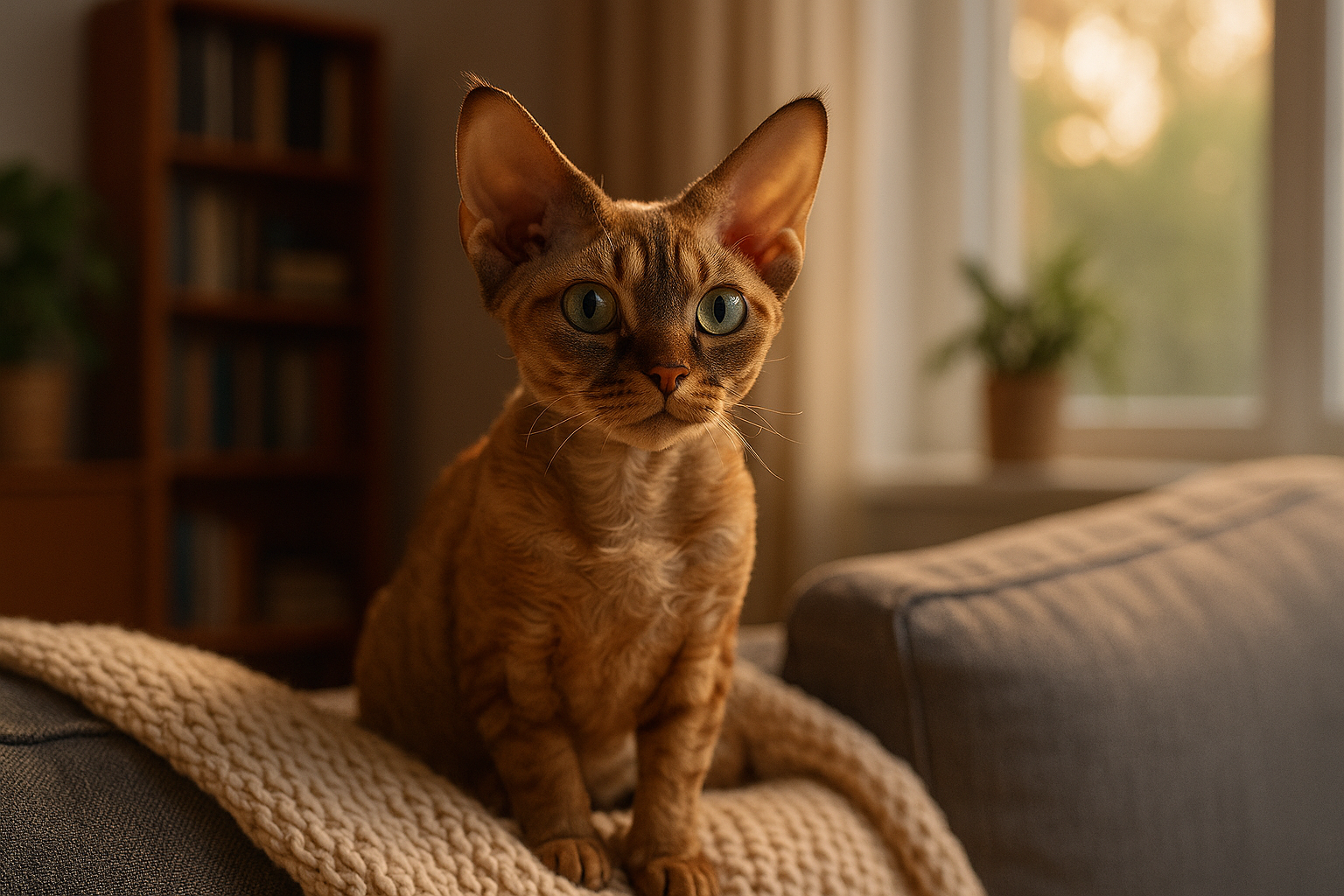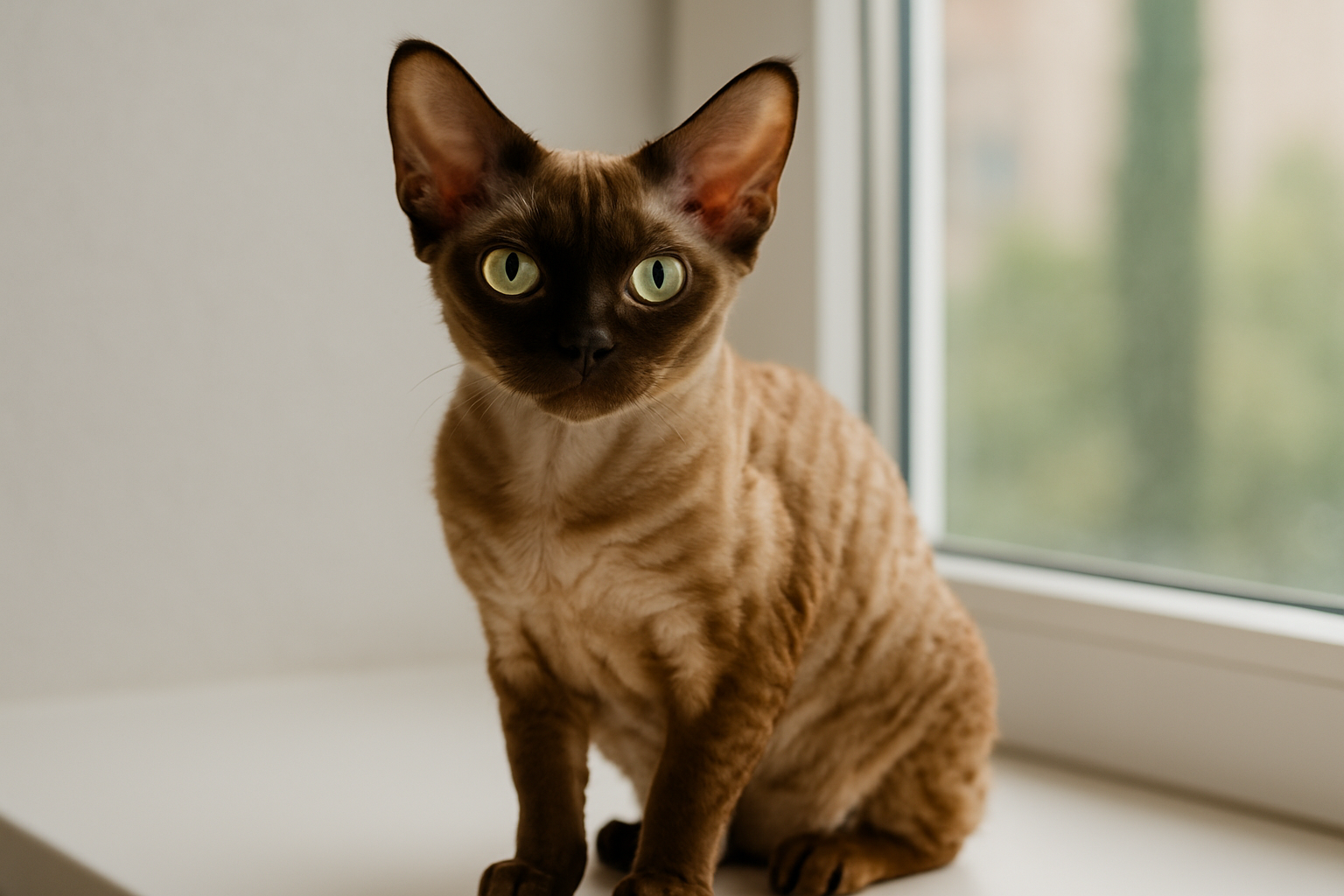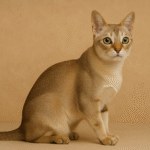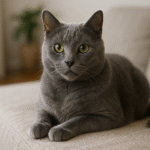The Devon Rex Cat is one of the most unique-looking—and charming—breeds in the feline world. With its large bat-like ears, prominent cheekbones, and soft, wavy fur, this cat almost looks like a little pixie or a mischievous elf. But don’t let the whimsical appearance fool you—Devons are full of personality and thrive on human attention.
Whether you’re drawn to their curly coats or their clownish antics, Devon Rex cats are beloved for their affectionate, intelligent, and playful nature. They’re often called “Velcro cats” because they love to stick close to their favorite humans.
Quick Breed Facts
- Origin: England
- Breed registries: CFA, TICA, FIFe
- Weight range: 5–10 pounds
- Lifespan: 12–16 years
- Coat: Soft, wavy, short hair
- Colors and patterns: Wide range, including black, white, chocolate, lilac, and more
- Eye color: Gold, green, blue, or odd-eyed
- Grooming: Low maintenance, minimal shedding
- Activity level: High
- Affection level: Very high
- Vocality: Moderate
- Good with children: Yes
- Good with other pets: Yes
History & Origin
The Devon Rex got its start in Devonshire, England, back in the 1950s. A curly-coated kitten named Kirlee was found near an old tin mine—and he looked totally different from your average cat. Turns out, Kirlee had a unique gene mutation (not the same as the Cornish Rex), and that wavy coat kicked off a whole new breed.
Breeders worked carefully to preserve those curls and playful personality. Today, the Devon Rex is officially recognized by cat registries like CFA and TICA. People sometimes confuse them with Sphynx cats, but Devons definitely have hair—just soft, short, and super curly.
Personality & Behavior
If you’re looking for a cat who wants to be part of everything you do, the Devon Rex is it. These little extroverts are full of mischief, charm, and cuddles. Don’t be surprised if they follow you from room to room, perch on your shoulder like a parrot, or burrow under the covers at bedtime. They’re happiest when they’re right in the middle of the action.
Devons are also super smart. Some learn to play fetch, do tricks, or even walk on a leash. They’ve got big personalities in small, curly packages—and they’ll keep you laughing every day. If you’re into independent, aloof cats, this probably isn’t the match for you. But if you want a snuggly sidekick with a sense of humor? The Devon Rex is all in.
Grooming & Shedding
One of the most common questions people ask is: Do Devon Rex cats shed? The answer is—barely. Their soft, curly coat doesn’t have a thick undercoat like most cats, so you’ll see way less loose fur floating around. And when it comes to allergies, the Devon Rex is often a better choice. While no cat is completely hypoallergenic, their minimal shedding and fine coat make them easier for many allergy-prone folks to live with.

You won’t need to brush them much—actually, brushing can mess up their delicate waves. A quick wipe with a damp cloth once a week usually does the trick to keep them clean and comfy.
Activity & Play
Devons are bouncy little athletes with energy to spare. They love to climb, leap, and explore—and they’re smart enough to turn just about anything into a jungle gym. You’ll find them scaling bookcases, launching themselves onto curtain rods, or curling up in the oddest high-up places. If there’s a shelf, they’ll find it. If there’s a cabinet, they’ll open it.
These cats thrive when they’re mentally and physically engaged, so vertical space is a must. Cat trees, climbing shelves, window hammocks, and puzzle feeders are all great options to keep them busy. Daily play sessions with teaser wands or laser pointers also help burn off that extra steam—and prevent mischief caused by boredom.
Health & Lifespan
Devon Rex cats are usually healthy and can live around 12 to 16 years with good care. Like many purebred cats, they do have a few health quirks to watch out for—things like heart disease (HCM), loose kneecaps (patellar luxation), and a rare muscle condition that can affect how they move. Choosing a trusted breeder and staying on top of vet visits goes a long way toward keeping them feeling their best.
One small heads-up: those oversized ears can collect wax more easily than most. A gentle clean now and then helps keep things tidy and infection-free.
Family Compatibility
Devon Rex cats thrive in homes where there’s plenty of love and attention to go around. They’re incredibly social and tend to bond closely with their people—whether that’s a single adult or a big, bustling family. These cats are gentle enough for respectful kids and playful enough to keep up with them. Just make sure younger children know how to handle them softly, since Devons have delicate frames.
They also get along well with other cats and even cat-friendly dogs, especially if introduced properly. In fact, many Devons enjoy having a buddy to play or nap with when their humans are busy. If your household is active, social, and full of cozy spots to hang out, a Devon will fit right in—and probably claim the warmest lap in the house.
Recommended Supplies
Along with the basics—litter box, scratching post, and a rotating stash of toys—Devon Rex cats need a few extras to stay happy and comfy. Because of their short, fine coats and lean builds, they tend to seek out warmth. Think plush cat beds, heating pads, or even a soft hoodie to snuggle in. A cozy window perch can quickly become their favorite napping spot.
These cats are also smart and curious, so puzzle toys, tunnels, or interactive feather wands help burn energy and keep them from getting bored. You don’t need to brush them often, but having a soft microfiber cloth on hand for the occasional wipe-down is a good idea. And since many Devons love riding on shoulders or being toted around, a comfy, well-ventilated travel carrier can make vet visits a lot less stressful.
Devon Rex Cat Price
Thinking about bringing home a Devon Rex? You’ll usually see prices ranging from $1,000 to $2,500 USD, depending on the breeder, where you live, and whether the kitten has show-quality traits. Unique colors like black or white Devon Rex cats might cost a bit more, especially if they come from a champion bloodline.
If you’re open to adopting, check with rescue groups or breed-specific shelters. It’s often more affordable—and you’ll be giving a loving home to a cat that really needs one.
Sphynx Cat vs Devon Rex
People often mix up these two breeds—and it’s easy to see why. Both have big ears, big personalities, and that one-of-a-kind “alien cat” vibe. But here’s the key difference: Sphynx cats are totally hairless, while Devon Rex cats have a soft, curly coat that feels like suede.
Devons tend to be a little more bouncy and mischievous, always climbing something or poking their nose where it doesn’t belong. Sphynx cats, on the other hand, are usually a bit more laid-back and love to snuggle. Both are affectionate, attention-loving companions—it just depends whether you want a cuddlebug with fuzz or without.
Final Thoughts
Devon Rex cats aren’t just cute—they’re companions with big personalities packed into small, curly-coated bodies. If you’re looking for a loving, energetic, and slightly quirky addition to your home, this might be your perfect match. Just be ready to share your pillow—and maybe your snacks—with a curious little shadow who never wants to leave your side.
Devon Rex Cat FAQs
Are Devon Rex cats hypoallergenic?
They are not fully hypoallergenic, but many allergy sufferers find them easier to tolerate due to their minimal shedding and fine, short coat.
Do Devon Rex cats shed?
Very little! Their coat is sparse and curly, which means far fewer loose hairs than other breeds. You may still see occasional shedding, but it’s minimal.
Are Devon Rex cats good with kids and other pets?
Yes! They’re playful, friendly, and love being part of the action—making them great with children, dogs, and other cats.
What’s the personality of a Devon Rex like?
Energetic, curious, and affectionate. These cats love to climb, snuggle, and entertain. They crave companionship and are happiest when included in daily life.
How much is a Devon Rex cat?
Expect breeder prices from $1,000 to $2,500 depending on pedigree and color. Adoption may cost less and is a great way to find one in need of a home.







